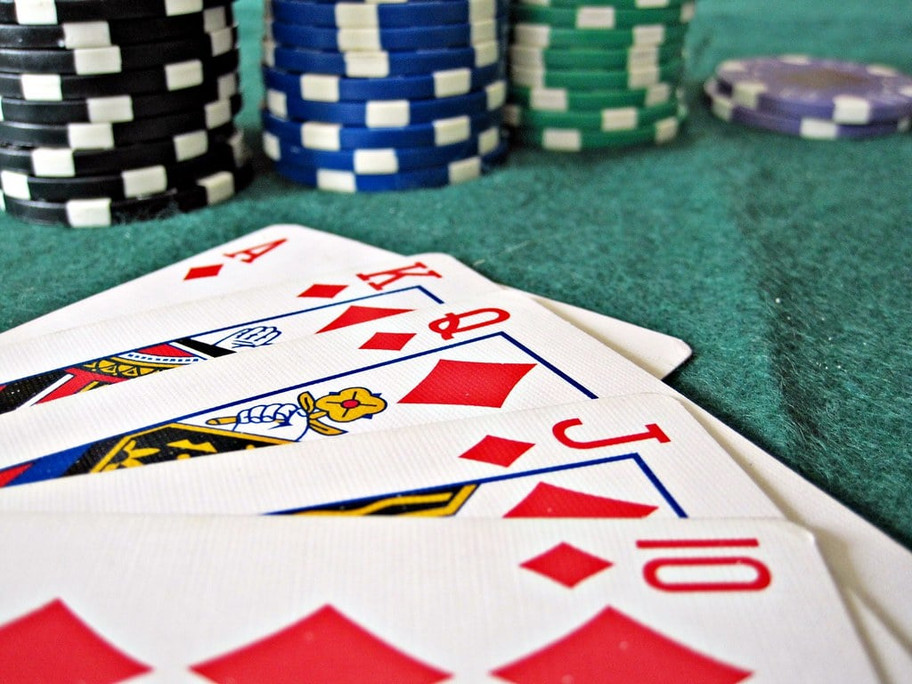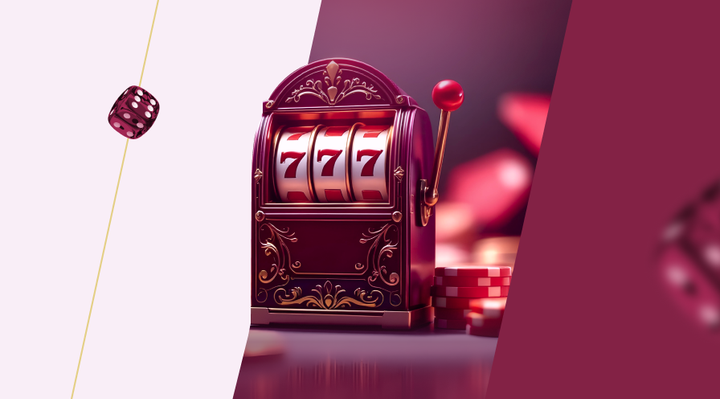How to play poker

Even outside of casinos, poker is a popular party game to play casually. However, poker isn’t as fun when players aren’t sure what to do. If you want to be better at poker, read on for our detailed guide on how to play poker for beginners. This guide will give you all the knowledge you need to start playing online poker games for real money with confidence.
There are several types of poker, with most variations played with a standard deck of playing cards. The primary aim is always the same: to get the best card combination and therefore beat an opponent’s hand.
WATCH:
Poker rules
We’ll focus here on offline poker, as there are fundamental differences between it and online casino poker. Don’t worry; if you’re more interested in the latter, we’ll let you know the differences later on!
A poker game - we’ll use the rules for Texas Hold ‘em, as it’s by far the most popular version around - consists of five rounds:
- ‘Pre-Flop’ - The player sitting on the dealer's left pays a small forced bet (small blind) and the next player to their left puts in a bigger forced bet (big blind).
Each player receives two face-down cards, starting with the player who made the small blind. After all players receive their cards, the player to the left of the one who placed the big blind starts. They can decide to:
- Bet
- Check (do nothing)
If they place a bet (by putting casino chips or money on the table, known as the ‘pot’) the other players can:
- Fold (lay their cards face down on the table and quit; this also means they lose any money already put in the pot).
- Call (add their own bet, to the same amount).
- Raise (match the bet, then add extra on top)
2. ‘Flop’ - The dealer will deal three community cards (shared cards placed face-up in the middle of the table, which stay there). Any player who hasn't folded can use these community cards with the ones in their hand to form the best hand they can. Players then enter another betting round.
3. ‘Turn’ - The dealer places another community card on the table. There’s another betting round.
4. ‘River’ - The dealer adds the fifth and final community card. The final betting round now happens.
5. After all players make their decisions, the game closes with the ‘showdown’. All cards go on the table and the player with the best poker hand wins.
Types of online poker games
Players still learning how to play poker have several popular online choices from which they can try to build their skills. Here are two of the most common:
Three-card poker
Three-card poker is a simple version that beginners should be able to learn well. A player starts by placing an ante bet (the first bet), then the player will be dealt three cards while the dealer receives three face-down cards.
Players then get the chance to fold or bet. If the player chooses to bet, they must place a stake equal to their ante bet. The result of the game could either be:
- The dealer’s cards are weak and can’t qualify. The player wins their ante bet with a 1:1 payout.
- The dealer’s cards are strong and qualify. If the player has a stronger hand, they win their ante bet and play bet.
- The dealer qualifies and has a stronger hand, leading the player to lose their bets.
Caribbean poker
The format for this doesn’t differ much from three-card poker, except the player starts with five cards instead of three.
When the player wins their play bet, the payout amount is determined by the player’s hand value. Online Caribbean poker will show the paytable on the screen so players can check the details during the game.
Understanding poker hand rankings
Here’s a list of poker hand rankings from the strongest to the weakest.
| Royal flush | 10, J, Q, K, A all from the same suit |
| Straight flush | Sequential order (e.g. 7, 8, 9, 10, J) from the same suit |
| Four of a kind | Four cards of the same letter or number |
| Full house | Three cards of the same rank, plus two matching cards from another rank (e.g. A,A, A, 3, 3) |
| Flush | Any five non-sequential cards from the same suit |
| Straight | Five cards in sequential order; an ace can complete the combination (e.g. A, 2 ,3 ,4 , 5). |
| Three of a kind | Three cards of the same letter or number |
| Two pair | Two different pairs of cards (e.g. 2, 2 ,3, 3). |
| One pair | Two cards of the same letter or number |
| High cards | The highest card you have in your hand, when you have none of the above. This can only be a winner when no players create a ranking combination. |
Advice for beginners
After a player masters the game’s basic rules, the most important thing to understand is that folding is often a better tactic than continuing to bet.
It’s understandable for beginners to want to go all the way to the showdown, because it’s exciting, but consider how much you may need to bet to reach that round. If you have a weak hand you’ll likely lose a lot more, compared to dropping out early and saving on losses.
Advanced strategies
If you play against other players, an advanced strategy involves bluffing.
This can be summed up by pretending to have a better hand than you do. Different players bluff in different ways; one common trick involves using a ‘tell’ (a certain type of behaviour, like scratching your nose) when you have a bad hand.
Other players will learn this from you over several games, so that if you use it when you have a really good hand, they’ll think you’re trying your luck. In turn, they’ll likely put more money in the pot expecting you to fold or reach the showdown and then lose.
Which you still might do! Suffice to say, poker requires as much luck as skill, so always play responsibly, whatever your level.
Poker etiquette
Aside from the game rules, poker has plenty of etiquette that players should follow. Although these are unofficial rules, adhering to them in online and offline poker tables is advised.
Be respectful to everyone
Some live poker tables online allow players to converse with each other or at least the dealer, so they retain the social aspect of land-based poker. Respecting other players and the dealer when using this chat feature is important.
Don’t interrupt others
When it’s time for a player in an offline game to make a move, it’s an unwritten rule not to interrupt. This includes not commenting or distracting them from making their choices.
Know the rules
It’s not against the rules for beginners to join a poker game, but it’s a common courtesy to join a game that suits your level. Online and live dealer games are the best option in this regard, as you don’t have to worry about bothering anyone about the rules, or making rookie mistakes like raising too high and too often.
Poker tells and player behaviour
Body language is clear when playing offline; for normal online and live dealer poker, there are no other players to worry about.
Whether offline or playing on a dedicated poker site, one of the easiest tells to spot is a player’s betting pattern. If you notice a player making the same kind of betting patterns, you can start to see what kind of player they are (patient, aggressive, etc); and alter your own strategy accordingly.
Tournaments
Dedicated online poker sites run a whole range of tournaments. These all have an entry fee and have players compete to win a portion of an overall prize pot.
On the other hand, normal casino sites might run a tournament across a select provider’s live dealer games, where there’s a chance to win prize money based on a leaderboard, or if you make certain hands and so on.
Online poker vs live poker
Here are the key differences between online (video) poker and the in-person version.
| Online poker | Live poker |
| Available 24/7 | Limited tables |
| No social interaction | High social interaction |
| Lower minimum stake | Minimum stake can be very high |
| Players may play with a casino bonus | No bonuses available |
Step-by-step guide to play poker online
Whether you’d like to join a dedicated online poker room, or a normal online casino, the process is largely the same:
- Find a trustworthy site to play poker. You can check out FIRST’s list of the best poker sites in the UK, based on strict criteria. Once you find a site that suits your preferences, sign-up.
- When you register for a new account, you’ll have to enter personal details, such as your email and address.
- Once your account’s set-up, make a deposit.
- Join a poker game!
Poker terminology
We’ve touched on a few core terms throughout this article, but here’s a glossary for quick reference that can help new players learn how to play poker. For more, check out our full A-Z of poker terms.
| 3-bet | Otherwise known as the third bet in a round, i.e when two players raise their bets consecutively after the first player has made the initial bet. |
| All-in | When a player puts all their chips into the pot. |
| Ante bet | Another name for the first bet. |
| Blinds | These are compulsory bets that players must make before the game begins. |
| Bluff | A behaviour that good players exhibit where they pretend they have bad cards, to encourage other players to place higher bets, or when they pretend they have better cards in hope their opponents will fold. |
| Buy-in | The amount players pay to join a poker game. |
| Call | This is where you match the bet of another player or decide to raise the bet. |
| C-bet | This is shorthand for a continuation bet. |
| Check | Unlike the self-explanatory ‘bet’, check is when you do nothing. |
| Community card | If you don’t fold, sometimes the dealer will display an array of cards that you can use to your advantage, when these cards are displayed they are displayed to everybody hence the name. |
| Fifth street | The fifth stage or the last round of poker before the showdown. |
| Flop | This is the first three face-up (community) cards laid out on the table. |
| Fold | To discard one’s hand and give up interest in the current pot. |
| Hand | The cards you have been dealt. |
| Hole cards | Face-down cards which only the dealt player can see. |
| Kicker | A side card that isn’t a part of the hand, but may be used to break ties when there are equal hands. |
| Limping | When a player starts the pre-flop betting by calling and not raising. |
| Muck | An alternative word to fold, can also be used at showdown. |
| No-limit | A type of poker that doesn’t limit how much players can bet at any time. |
| Nuts | Describing the best possible hand after all cards are dealt. |
| Pocket pair | When a player is dealt two cards with the same ranking of their starting hand. |
| Poker rooms | Specific tables running poker for the public in casinos, land-based and online. |
| Pot limit | The amount of allowed bets a player can make during a poker game. |
| Pre-flop | This is the point in the game in between the players receiving their playing cards and before the first three community cards are dealt. |
| Raise | This is matching your opponent's bet plus an extra bet on top, this proves the confidence in your hand. |
| Rebuy | Rebuy means the player will pay the same amount as the original buy-in, receive a fresh stack and retain their seats in the tournament. |
| Ring game | Cash poker game but with looser poker rules. |
| River | Following the fourth community card being added to the table, a river is when the dealer places a fifth community card and the final betting round commences. |
| Split Pot | When a pot is fairly divided among the winners. |
| Squeeze | Raising when the previous player raised. |
| Top pair | The best pair on the board. |
| Turn | This is when the dealer adds another community card to the table after adding three. |
| Under the gun | A player left to the big blind. |
| VPIP (voluntarily put in pot) | A player who’s highly active pre-flop and is more likely to add into the pot outside of the forced blinds. |
FAQs
What’s different between Texas Hold ’em and Omaha poker?
There are many differences between Texas Hold ’em and Omaha. The number of hole (face down) cards dealt to players differs, with Texas Hold ‘em giving two and Omaha giving four, for example.
How can someone determine the winning hand in poker?
Each card combination in poker has a ranking. Refer to the table above to know which combination has a higher value.
What is the role of the blinds and the dealer button in poker?
Blinds act as a tool that drives action and forces players to get involved. Meanwhile, the dealer button helps indicate whose responsibility it is to deal with the cards.
What is a bluff in poker and how do I use it effectively?
A bluff is a strategy that poker players use by acting a certain way to conceal the strength of their hands. Bluffing aims to force other players to fold.
What’s a 3-bet in poker?
A 3-bet is a poker term referring to the first re-raise made before the flop. It can also refer to the first re-raise after the flop.
What does c-bet mean in poker?
A c-bet or continuation bet is when a player raises a pre-flop and continues by placing another bet on the flop.






 How to play slots
How to play slots
 Casino wagering requirements explained: How to earn your casino bonus
Casino wagering requirements explained: How to earn your casino bonus
 Responsible gambling at online casinos: How to stay safe when betting online
Responsible gambling at online casinos: How to stay safe when betting online
